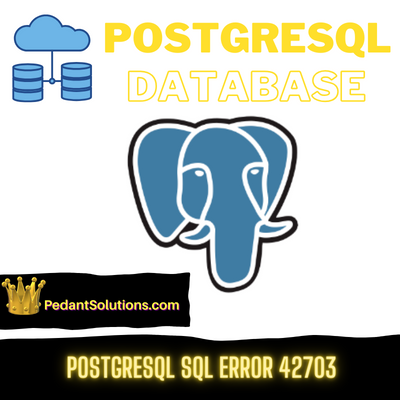PostgreSQL SQL Error 42703: Unpacking Column Ambiguity and Mismatch
PostgreSQL, a robust and feature-rich relational database management system, occasionally raises challenges for developers in the form of SQL Error 42703. This error code is associated with column-related issues, specifically pointing to ambiguity or mismatch in column references. In this article, we’ll explore the common causes behind PostgreSQL SQL Error 42703 and provide insights into resolving these column-related complexities.

Common causes of Postgresql sql error 42703
Ambiguous Column Reference
One of the primary culprits of SQL Error 42703 is an ambiguous column reference in your query. This occurs when a column name is used without specifying the table or alias, and PostgreSQL cannot determine which table the column belongs to.
Example
-- Ambiguous column reference without specifying the table
SELECT id FROM employees, departments WHERE id = 101;
Misspelled or Nonexistent Column
If a column name is misspelled or doesn’t exist in the specified table, SQL Error 42703 will be triggered. It’s crucial to double-check the spelling and existence of column names in your queries.
Example
-- Using a nonexistent column name
SELECT employee_id, salary FROM employees WHERE salry > 50000;
Unclear Column in a Join
When joining multiple tables and referencing columns without qualifying them with the table or alias, PostgreSQL may find it challenging to determine which column to use, leading to SQL Error 42703.
Example
-- Ambiguous column reference in a join condition
SELECT * FROM employees INNER JOIN departments ON id = id;
Column Ambiguity in Subqueries
Subqueries that reference columns without clear qualification can introduce ambiguity. It’s essential to specify the table or alias to avoid SQL Error 42703.
Example
-- Ambiguous column reference in a subquery
SELECT * FROM employees WHERE id = (SELECT id FROM departments WHERE name = 'HR');
Multiple Tables with the Same Column Name
If you’re working with multiple tables, and some of them have columns with the same name, referencing the column without qualification can lead to ambiguity.
Example
-- Ambiguity due to multiple tables with the same column name
SELECT id FROM employees, contractors WHERE id = 102;
Unqualified Column in Aggregate Functions
When using aggregate functions like SUM or AVG on columns without specifying the table or alias, PostgreSQL may struggle to resolve the ambiguity, resulting in SQL Error 42703.
Example
-- Ambiguous column reference in an aggregate function
SELECT AVG(salary) FROM employees, contractors WHERE salary > 50000;
Inspite of Postgresql sql error 42703, here’s a list of some common PostgreSQL error codes, including but not limited to Postgresql sql error 42703:
- SQL Error 42P01 – Undefined Table: This error occurs when a query references a table that does not exist in the database.
- SQL Error 42703 – Undefined Column: Triggered when a query attempts to use a column that is not present in the specified table.
- SQL Error 23505 – Unique Violation: Indicates that an attempt to insert or update a record violates a unique constraint.
- SQL Error 23502 – Not Null Violation: Occurs when an attempt is made to insert a null value into a column that has a NOT NULL constraint.
- SQL Error 42P02 – Undefined Parameter: This error is raised when using a parameter that is not defined in the context of the query.
- SQL Error 22001 – String Data Right Truncation: Signifies that a string or character data is too long for the specified column.
- SQL Error 42701 – Duplicate Column: Triggered when a table is created with duplicate column names.
- SQL Error 25P02 – In Failed SQL Transaction: Indicates a problem with transactions, often caused by trying to execute a query within a failed transaction.
- SQL Error 23000 – Integrity Constraint Violation: This error occurs when a foreign key constraint is violated during an insert or update operation.
- SQL Error 42602 – Invalid Syntax: Similar to SQL Error 42601, this error code is raised when there’s a syntax error in the SQL statement.
- SQL Error 28000 – Invalid Authorization Specification: Signifies authentication issues, such as providing incorrect login credentials.
- SQL Error 57014 – Canceling Statement Due to User Request: Occurs when a user cancels a running query or statement.
- SQL Error 22003 – Numeric Value Out Of Range: Indicates that a numeric value exceeds the valid range for its data type.
- SQL Error 08006 – Connection Failure: Raised when there is a problem establishing or maintaining a database connection.
- SQL Error 42P05 – Duplicate Table: Similar to SQL Error 42701, this error is raised when trying to create a table with a name that already exists.
- SQL Error 42601 – Syntax error: PostgreSQL uses error code 42601 to signify a syntax error within the SQL statement being executed. This error arises when PostgreSQL encounters a statement with a syntax it cannot recognize or correctly parse.
